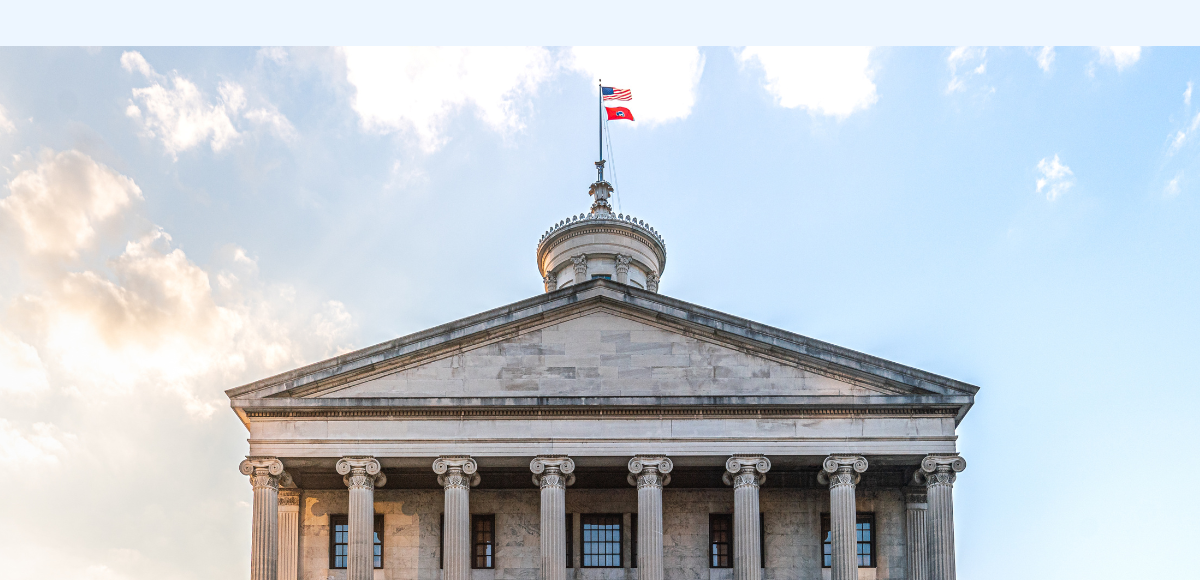
Tennessee legislators have introduced their bills for the second year of the 113th General Assembly, and at least 114 are related to ThinkTennessee’s issue areas of strengthening democracy and supporting working families. Combined with the bills carried over from 2023, there are nearly 200 bills we will be keeping our eye on. Below are the highlights from a few we’ll be watching closely.
STRENGTHENING DEMOCRACY
ThinkTennessee envisions a state where all Tennesseans are civically engaged and trust in a transparent and effective state and local government with adequate separation of powers between the branches of government. This year, 71 democracy-related bills have been filed, combined with 43 that are carrying over from last year, for a total of 114 bills with the potential to impact the strength of Tennessee’s democracy.
While there are some caption bills (placeholders that may be amended throughout the session) whose subjects are yet unknown, so far, the issues addressed include: voter registration policies, the voting rights restoration process, absentee voting, election processes and timing, and judicial integrity.
Voter Registration
As seen in previous years, bills have been introduced seeking to place new requirements on third-party voter registration efforts and requiring voters to register by political party.
- HB 1955 (Rudd-R)/SB 2586 (Taylor-R) would require third-party individuals and organizations collecting voter registration applications to register with the state for each election cycle before collecting applications. And it would place new responsibilities on the coordinator of elections to track and monitor applications collected by third parties.
- Two bills (HB 1616 (Richey-R)/SB 2631(Pody-R) and HB 2033 (Bartlett-R)/SB 1888 (Hensley-R)) would require voters to declare a political party affiliation when registering to vote.
Voting Rights Restoration
Recently, the state’s voting rights restoration process has been made more complicated (see this infographic for the steps required), and it is the focus of the largest amount (14) of voting bills this year.
- Bills seeking to address who is eligible for restoration, include HB 2107 (Dixie-D)/SB 1933 (Akbari-D) to allow expunctions for certain offenses, HB 2415 (Dixie-D)/SB 2867 (Oliver-D) to automatically restore voting rights after sentence completion, and two bills seeking to remove certain financial requirements from the eligibility process: HB 1256 (Camper-D)/SB 1241 (Akbari-D) and HB 0279 (McKenzie-D)/SB 0904 (Akbari-D).
- Additional bills address the restoration process, including HB 2380 (Parkinson-D)/SB 2913 (Bailey-R) that would waive petition costs for those seeking full restoration of rights, and multiple caption bills, including HB 2417(Dixie-D)/SB 2166 (Yarbro-D) and HB 2521 (Mitchell-D)/SB 2346 (Yarbro-D).
Other issues addressed this year include:
Election Processes: Proposed new requirements for training election officials and for verifying presidential electors who cast votes for the state’s presidential nominees for each party.
- HB 1799 (Rudd-R)/SB 1706 (Hensley-R) would require state approval for any organization seeking to provide election administration-related trainings or conferences to county election officials.
- HB 1794 (Rudd-R)/SB 1723 (Lowe-R) would stipulate a process for selecting presidential electors and their voting and certification process.
Election Timing: A handful of bills seek to change the timing of certain elections.
- Two bills would align municipal elections (HB 2770 (Lafferty-R)/SB 2609 (Niceley-R)), and local school board elections HB 2891 (Todd-R)/SB 2924 (Bailey-R), to the August/November general election cycle.
- HJR 0013 (Lamberth-R) carries over from last session where it passed the House. The resolution proposes a constitutional amendment to change the date of county elections from August to November. If the resolution passes the Senate this year, it must pass with a two-thirds majority in both chambers again in the 114th General Assembly before being placed on the November 2026 ballot.
Absentee Voting: Three bills propose changes to the absentee voting process.
- HB 2294 (Rudd-R)/SB 1967 (Briggs-R) seeks to change the deadline for requesting absentee applications from 7 to 10 days before Election Day.
- Tennessee voters are required to return absentee ballots by mail, making it challenging for ballots requested on the last available day to make it in time to be counted. See ThinkTN’s recent fact sheet proposing an alternative solution to address this issue: allowing voters to return ballots in person if needed.
- HB 2293 (Davis-R)/SB 2118 (Massey-R) proposes changes to absentee procedures to accommodate voters with a print disability or low vision.
- HB 2531 (Burkhart-R)/SB 2212 (Powers-R) proposes allowing Montgomery County to study a new process for receiving absentee votes from members of the armed forces overseas.
Judicial Integrity: Multiple bills seek to create new court(s) within multiple judicial districts, and one addresses the role of courts in the state.
- HB 1652 (Bulso-R)/SB 2225 (Lowe-R) seeks to prohibit any court’s ability to rule on the legislature’s internal rules and procedures.
SUPPORTING WORKING FAMILIES
ThinkTennessee’s working families’ priorities include advocating for increased access to paid family leave, ensuring fair wages, mitigating the harms of court debt, affordable, high-quality childcare, encouraging more sustainable, affordable, and multimodal transportation, and access to high-quality, safe, and affordable housing.
We will be watching 78 bills addressing these issues (44 filed this year and 34 carried over from 2023). Key bills we will be watching include:
Affordable Housing
The largest number of bills (18) filed related to supporting working families relate to affordable housing, including providing assistance for first-time homebuyers and requesting a TACIR report on the availability of affordable housing. Additional highlights include:
- HB 2623 (Carr-R)/SB 2496 (Gardenhire-R) and HB 2725 (McKenzie-D)/SB 2532 (Lamar-D) both seek to remove the current prohibition on local governments providing voluntary housing incentive programs, albeit in different ways.
- HB 2292 (Davis-R) /SB 2124 (Briggs-R) would require municipal and metropolitan governments to adopt at least four of a provided list of housing policies or else lose eligibility for some state grant funding.
Childcare
Not far behind housing, 11 bills were filed this year related to childcare, including:
- HB 1927 (Cepicky-R)/SB 1901 (Hensley-R) would allow LEAs and public charter schools to reimburse teachers for childcare expenses and require the state to partially reimburse schools for the expense.
- HB 2317 (Williams-R)/SB 2374 (Watson-R) would require a TACIR study of the state and local laws governing childcare businesses to identify those that impose unnecessary costs or financial barriers on businesses.
- HB 0785 (White-R)/SB 0750 (Massey-R), rolls over from last year and would create a “Promising Futures Account” for the state to distribute privilege tax collections from sports wagering to support scholarships to assist parents and legal guardians attend high-quality early care and learning programs.
Paid Family Leave
Following last year’s passage of six weeks of paid family leave for some state employees, bills this year seek to expand the pool of who is eligible for similar coverage.
- HB 1554 (Slater-R)/SB 1545 (Rose-R) would extend six weeks of paid leave to state employees who have become foster parents to a minor child.
- HB 2923 (Slater-R)/SB 2830 (Haile-R) and HB 2697 (Moody-R)/SB 2655 (White-R) would extend the same to public charter schools for the birth, stillbirth, or adoption of a newly placed minor child.
- SJR 0848 (Yager-R) urges the state to develop a comprehensive statewide Paid Family Caregiving Policy and Program to support family caregivers in the state.
Fines and Fees
Bills have been introduced seeking to impose new fees and requiring transparency measures for fee types and assessment of fees.
- HB 2099 (Cochran-R)/SB 2049 (Stevens-R) would allow counties to impose a new $12.50 fee in every misdemeanor and felony cost bill except for non-moving traffic violations that would be remitted to county governments to support funding for the district attorney general within the related judicial district.
- HB 2651 (Chism-D)/SB 2474 (Akbari-D) would require county court clerks to compile and share with the Administrative Office of the Courts (AOC) monthly reports on the criminal fines and fees assessed, and for the AOC to make that information available in a searchable database.
As always, we’ll be following along with the discussion of all these bills and more in the coming weeks. Stay tuned!




